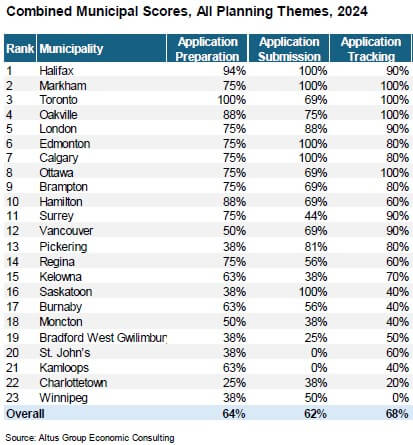Municipal Benchmarking
How do municipal processes, approvals, and government fees and charges affect housing affordability in Canada?
This study is intended to help establish standards that municipalities can and should aim to meet, and that industry and the public can and should call for, with supporting data and best practices to show the way. It is an opportunity to start a productive conversation for all, identifying best practices, ways to improve processes, and opportunities for governments and industry to work together to tackle affordability and other housing challenges.
Housing affordability continues to be a challenge in all parts of the country. A key component of affordability is the price of a home, and a major part of the price is the cost to develop and build. In Canada, municipal processes, approvals, and charges have been steadily increasing. This adds cost to building both low-rise and high-rise housing, contributes to higher prices, and ultimately erodes affordability.
The Municipal Benchmarking Study was commissioned by CHBA and delivered by Altus Group. The study compares 23 Canadian municipalities, examining how their processes, approvals timelines, and charges and fees contribute to housing affordability and supply issues in major housing markets across Canada. The report reads as a report card to show which municipal governments are leading in which of the three pillars of the study—planning system features, approval timelines and government charges.
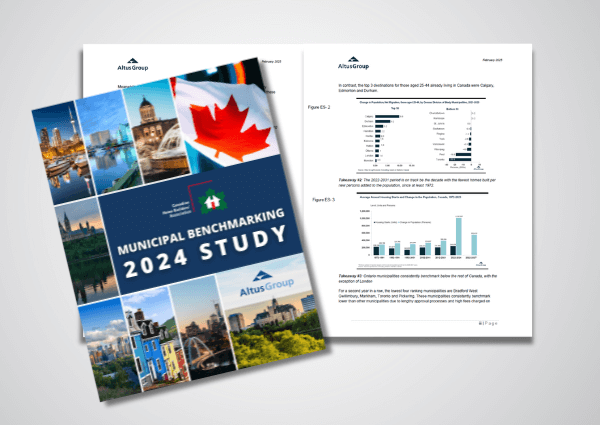
CHBA's Municipal Benchmarking Study
[Click here for reduced file size PDF for faster load time]
The research started with data from June 2022 onwards (to avoid overlap with the previous study). The study does not include any potential impacts on housing as a result of the changes a municipality may have made as a result of receiving money from the federal Housing Accelerator Fund.
Municipal Benchmarking Study - Best Practices
This document summarizes the findings of CHBA’s 2024 Municipal Benchmarking Study and includes best practices that governments should consider implementing to improve housing supply outcomes and affordability in their communities. It also includes related policy recommendations, such as new proposed infrastructure funding models to reduce reliance on municipal DCs, as well as ways provinces and the federal government can support municipalities in meeting home building targets.
Municipal Benchmarking Study - Best Practices Checklist
This checklist outlines best practices governments should consider implementing to improve housing supply outcomes and affordability in communities across Canada. These recommendations are derived from the key findings of CHBA’s 2024 Municipal Benchmarking Study and are divided into three improvement areas: development charges (DCs), rules and regulations, and the development application process.
CHBA CEO Kevin Lee speaking about the Municipal Benchmarking Study on March 4. Watch the recording here.
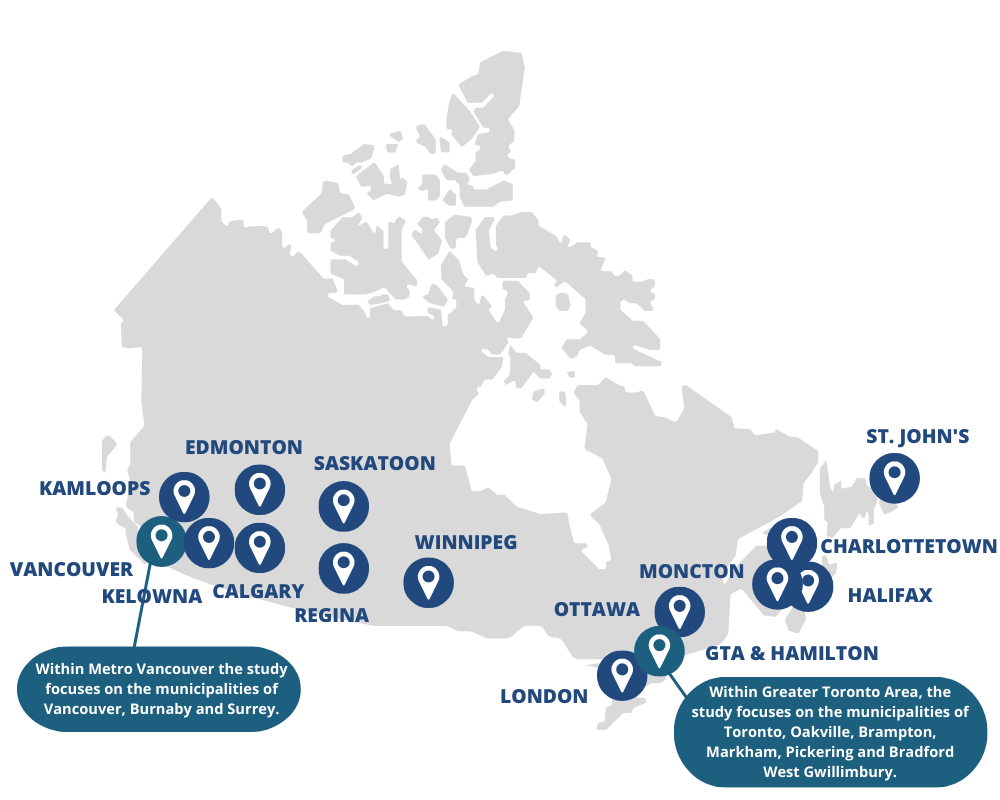
Summary of Findings
Each participating municipality has been assigned a score that combines their performance on planning features, approvals timelines and government charges. This ranking provides a short-hand to show which municipal governments are leading in which of the three areas at the moment, as well as an overall ranking. The 2024 edition also provides further detail on how a municipality’s performance on these measures influences housing outcomes and the total cost implications of these processes and policies.
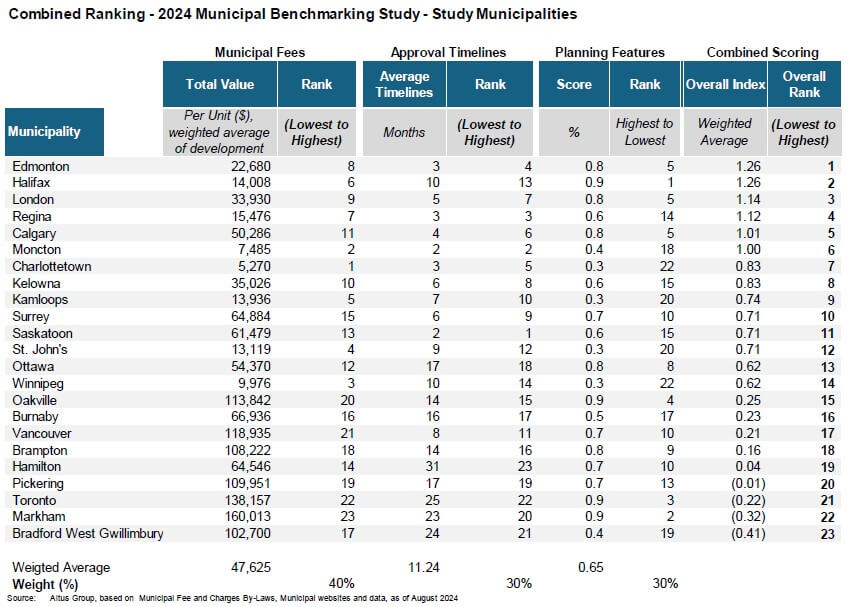
Municipal Factsheets
In addition to the report, CHBA has assembled local Municipal Benchmarking Study Factsheets that are available below. These local factsheets summarize the key findings from the Municipal Benchmarking Study for each participating jurisdiction. This study, along with the accompanying factsheets, is meant to help participating local HBAs communicate and collaborate with their municipalities on development processes, approvals and charges.
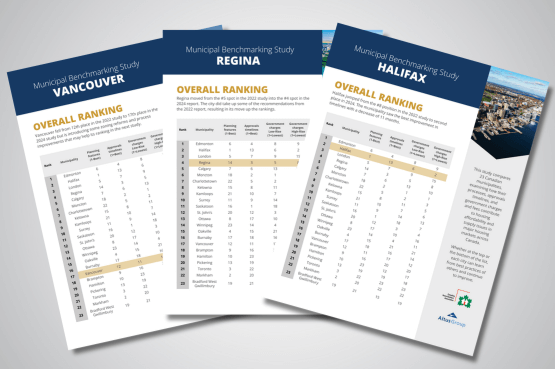
Best practice examples
The 2024 Municipal Benchmarking Study identifies ways to improve processes, and outlines opportunities for governments and industry to work together to tackle affordability, supply, and other housing challenges. Some examples of best practices include:
- Municipalities can help improve the quality of development submissions by making resources available on their websites to help applicants with their preparation process. By receiving better quality submissions, municipal staff can spend less time on non-review activities and more time reviewing applications, resulting in faster processing.
- Have a dedicated webpage for application support materials that includes a list of study requirements for applications, a minimum to be scored, etc.
- Ensure that terms of references include statements for when a study is required and when it is exempt.
- Provide both in-force and historic zoning data.
- Provide search functionality within staff directory that is connected to the planning or building department’s “contact us” page.
- Create online submission options for planning applications and building permits.
- List specific types of applications that can be applied for.
- Have FAQ (frequently asked questions) webpages available to answer common questions.
- Provide both a dedicated webpage and an interactive map for active application information.



